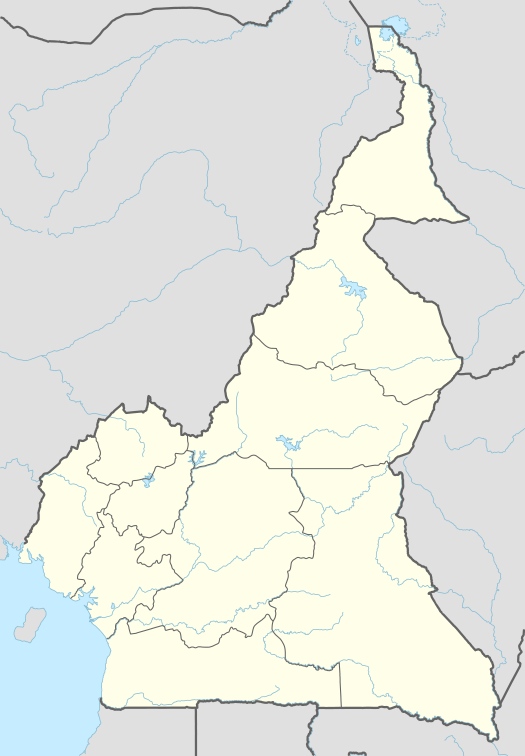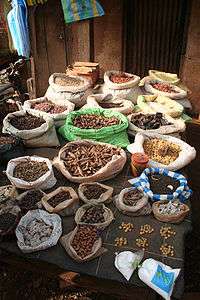Dschang
| Dschang | |
|---|---|
 | |
 Dschang Location in Cameroon | |
| Coordinates: 5°27′N 10°04′E / 5.450°N 10.067°E | |
| Country |
|
| Region | West |
| Department | Menoua |
| Area | |
| • Total | 225 km2 (87 sq mi) |
| Elevation | 1,380 m (4,530 ft) |
| Population (2012) | |
| • Total | 76,524 |
| • Density | 340/km2 (880/sq mi) |

Dschang is a city located in the West (Ouest) Province of Cameroon, with an estimated population of 87,000 (est) in 2001, growing dramatically from 21,705 recorded in 1981.[1] The 2006 Population is estimated to be 200,000 inhabitants.
Dschang is the capital of the division of Ménoua. The Bamiléké are the predominant ethnic tribe.
History
Colonial era

The documented history of Dschang began in 1895, when it was "discovered" by a German military mission. In 1909, the city replaced Fontem as the capital of a Germany military district. The region where Dschang now exists was then not the place of any major settlement but, instead, was an area that two bordering chiefdoms fought over. The name Dschang translates to "dispute" in the local language.
Following Germany's defeat in World War I, Cameroon became a British possession in 1917. The country was subsequently handed over to the French in 1920, who declared Dschang to be the capital of Ouest Province, and developed the city's vacation resort in the 1940s. This resort now forms the basis of Dsh's plans to promote Dschang as a tourist destination.
Post-colonial era
On January 1, 1960, Cameroon became an independent state, and the regional administration was moved to the city of Bafoussam. Dschang suffered from this move, as much more effort was invested in the infrastructure of Bafoussam.
Following the institution of the Université de Dschang (University of Dschang) in 1993, however, foreign interest and developmental investment of the city began to increase, and plans for a drive to increase tourism and the exploitation of mineral deposits will contribute to the city's development.
The current Mayor of Dschang is Pr. Bernard Momo.
Economy and infrastructure
Due to its high elevation of over 1400 m,[2] Dschang is favoured by relatively cool temperatures and attractive scenery. It is therefore regarded as a mountain tourist resort. Since colonial times, Dschang has been an important agricultural center. Pig production plays a major role.
Deposits of the aluminum-bearing ore bauxite have been discovered nearby;[3][4] however, a lack of infrastructure has prevented full-scale mining operations to date.
Transport
The town is reached by year-round trafficable dust roads or asphalt roads. There are bus connections to Bafoussam and Yaoundé. There is also an airstrip.[5]
Coordinates: 5°27′N 10°04′E / 5.450°N 10.067°E
Higher education
Since 1993, Dschang has a university with faculties for Agricultural Sciences; Economic Sciences and Business Management; Humanities; Law and Political Sciences; and Sciences. The Faculty for Agricultural Sciences has been the first faculty and the university continues to be very strong in this thematic area.
Culture
The population of Dschang mainly speaks Yemba language,[6] a Bamileke language.
In early 2011, the Musée des Civilisations du Cameroun à Dschang was inaugurated.[7][8] This museum offers to discover the origin of the Cameroonian people and the diversity of the country's four large cultural domains via their history, but also their artistic productions, their architectures, and their political and social organizations.
References
- ↑ Encyclopædia Britannica
- ↑ Location & Climate
- ↑ Main economic indicators 1999-2000
- ↑ Bauxite find
- ↑ Airport of Dschang
- ↑ "Yemba.net - Online Dictionaries and Learning Tools for the Yemba Language". Aleco. 2012-03-13. Retrieved 2012-03-13.
- ↑ Inauguration of the Museum of the Civilizations of Cameroon at Dschang
- ↑ Musée des Civilisations du Cameroun à Dschang